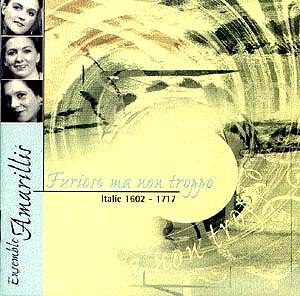Ensemble Amarillis with Maryseult Wieczorek
(mezzo-soprano)
Music of 17.C Italy 'Furioso ma non troppo''
 Ambroisie AMB 9901
73'10"
Ambroisie AMB 9901
73'10"
contact surmelin@aol.com

This is one of those CDs whose tasteful presentation in one of the new formats
(since the jewel case lost its monopoly) gives anticipatory pleasure, which
is undiminished by hearing the contents. The programme of 17 C.mannerist
and baroque Italian music (1802-1717) ranges widely, and rings the changes
on voice, flutes and oboe, cello, harpsichord and positif organ, ensuring
avoidance of monotony. The instruments are mostly modern copies of authentic
instruments of the period.
It begins with a delectable piece for the instruments, featuring the recorder,
by Pandolfi, followed by a powerful and moving Dido's lament by D'India,
sung with style and beauty of voice by Maryseult Wieczorek. Next a charming
duet by one Bartolomeo de Selma y Salaverdi for florid recorder (Heloise
Gaillard) and cello (Ophelie Gaillard), duetting over an organ accompaniment.
The composers include Frescobaldi (an improvisatory Toccata prima played
with sensitivity and virtuosity on harpsichord by Violaine Cochard, and Corelli's
famous La Follia in a spectacular version with fireworks for recorder
and cello. The sequence draws you on, and you encounter less familiar names
such as Falconieri, Jacchini and Pandolfi, some music gay, other grave and
pensive. The writer suggests making the most of the CD tracking capability
by varying the juxtapositions of music composed in a period of change.
The popular 'aria antiche' Amarilli mia bella by Caccini, beautifully
done by Maryseult Wieczorek, may have spurred the young women to adopt the
name Ensemble Amarillis. For Lotti's cantata Ti senso Heloise
Galliard exchanges her recorders for oboe. Pandolfi's La Bernabea
gives scope for the flautist to show staggering virtuosity, as does the cellist
in Jacchini's sonata , which veers from adagio to Presto prestissimo,
and may explain the CD's fanciful title, Furioso ma non
troppo.
The booklet is a pleasure to hold and peruse, and no care has been spared
on this production at any level. No reservations, and I look forward keenly
to their future releases.
Reviewer
Peter Grahame Woolf

